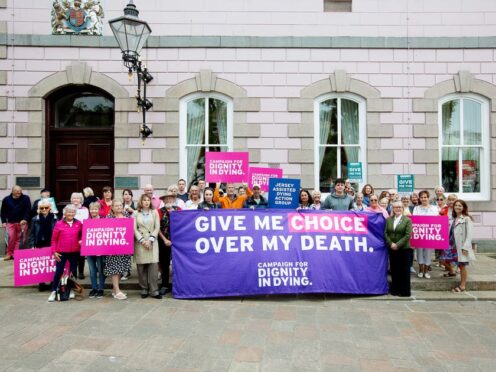
Jersey’s parliament saw emotional scenes as politicians debated ahead of voting on whether laws should be drawn up to establish an assisted dying service on the island.
Proposals for how a law in this area would work were published in March and politicians have been discussing this week whether legislation should be drafted.
The process for drafting a law could take around 18 months.

If such a law is approved, it is expected a further 18-month implementation period will then begin, meaning the earliest for it to come into effect would be summer 2027.
A series of votes were due to take place on Wednesday, including on whether the island should have a law establishing an assisted dying service for adult residents who have made a voluntary and informed decision to die.
During debate States Assembly member Deputy Tom Coles spoke of the right to choice, both for those who support assisted dying and those who do not.
With his voice breaking and pausing to compose himself, he said: “I know my wife would do anything for me. But if I get to my end… if I get to my end, I do not want her to do the things that I don’t want her to do for me.
“I want this to be my choice. And I think that, by denying anybody their right to choose, when they get into that situation, that is not fair.
“But I also respect that there are people who will not wish to do this service. There are people who do not want this to be their choice. And I also support that. So the fact that this entire process is completely opt-in and not opt-out is where I find my balance with all this.”
But fellow States Assembly member, Dean Michael Keirle, warned of the risks of people coming under pressure to end their lives, especially under what is known as route two for those with an incurable physical condition which might not be terminal but is causing them unbearable suffering.
He told the Assembly: “It would be fantastically naive to think that people won’t come under some kind of indirect societal pressure, especially under route two.
“As a priest I’ve seen grooming at every level. In 35 years of ministry I’ve seen humanity at its absolute best in death and, sadly, at its absolute worst. As the old saying goes, where there’s a will, there’s a family.
“So let’s not pretend that this will not impact upon those who are vulnerable.”
He added that it is the most vulnerable who could face the greatest risks.
He said: “Yes, the argument for (a change in law) is being championed by people who are confident and articulate and in the name of personal choice. There is little risk to those people.
“But the risks affect those least able to speak for themselves. They always do.”
Deputy Elaine Millar described the report published earlier this year containing proposals for how an assisted dying service might work as a “very detailed, thorough and thoughtful piece of work”.
But she acknowledged that, due to the divided nature of opinion on this controversial issue, whichever way the vote goes “very large numbers of people would be disappointed by the outcome”.
In 2021, just over three-quarters (78%) of the members of a citizens’ jury on Jersey agreed that assisted dying should be permitted, and later that year the States Assembly became the first parliament in the British Isles to decide “in principle” to allow assisted dying.
The proposals have been “very much influenced and informed by the views of islanders”, health and social services minister Tom Binet said ahead of this week’s debate.
He added: “I think all the indications are that a majority of people actually want this.”

Enjoy the convenience of having The Sunday Post delivered as a digital ePaper straight to your smartphone, tablet or computer.
Subscribe for only £5.49 a month and enjoy all the benefits of the printed paper as a digital replica.
Subscribe